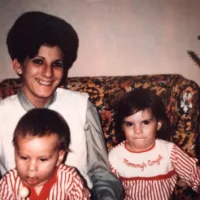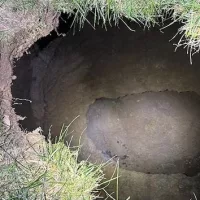
(CRESCENT, Okla.) — The 28-year-old lab worker investigated alleged wrongdoing at an Oklahoma nuclear fuel facility, and was on her way to meet with a New York Times reporter when she died in a fatal car crash.
Fifty years ago, the death of a 28-year-old plutonium plant worker and whistleblower in Oklahoma — a death many found mysterious and sparked decades of speculation — shocked the nation.
The official story was that Karen Silkwood died in a one-car crash on Nov. 13, 1974. She was on her way to meet a New York Times journalist, reportedly to hand over documents she’d secretly been collecting at her job at a nuclear facility. The Oklahoma State Highway Patrol concluded that Silkwood fell asleep at the wheel — possibly under the influence of prescribed drugs — drove off the highway, crashed into a ditch, and died.
“We’ve never believed it,” Mike Boettcher said of the official narrative. Boettcher and his reporting partner Bob Sands, both veteran Oklahoma journalists, say many in Oklahoma speculate that Karen Silkwood may have died for what she knew.
Silkwood’s story has become widely known, inspiring several books, articles, and a major motion picture.
ABC Audio’s new podcast, “Radioactive: The Karen Silkwood Mystery,” hosted by Boettcher and Sands, explores the secrets Silkwood was uncovering and what some say is the mystery surrounding her death.
Silkwood worked at a nuclear fuel production plant that manufactured plutonium fuel rods to power a new type of nuclear reactor, which was part of a multi-million dollar experiment to enhance nuclear energy. When she noticed what she felt were unsafe working conditions — such as leaks, spills and co-workers frequently getting contaminated with radioactive material — she spoke up and tried to make improvements.
“Karen became nuclear energy’s first whistleblower, though the term whistleblower was just starting to be used,” Boettcher said. “This was at a time when the idea of someone inside of a big corporation exposing alleged misdeeds was shocking.”
Silkwood’s allegations, contamination, and untimely death sparked an investigation by the Oklahoma Highway Patrol, an FBI inquiry, a civil lawsuit, several appeals, a congressional hearing and two appearances before the U.S. Supreme Court.
Several news outlets investigated the matter, and Silkwood’s story gained significant attention in 1983 with the release of “Silkwood,” a movie based on her life. In a performance that earned her an Oscar nomination, Meryl Streep portrayed Silkwood in the film.
For fifty years, this story has been one Boettcher and Sands say they can’t get out of their minds. Suspicion of foul play has swirled around it for decades: What had Silkwood uncovered? Who had she upset? Why did her car crash into a concrete wall? Was a second vehicle involved?
“There are fewer and fewer people alive to share what they know from the night Karen died,” Sands said. “Many of the people who worked with Karen in the plant are dead.”
However, Sands and Boettcher have new leads — never-before-heard investigative tapes, a fresh look at a critical piece of physical evidence. Plus, they tracked down people who can illuminate who Karen was and what she was uncovering about her workplace.
The duo first spoke with Michael Meadows, Silkwood’s son. He was only 5 years old when his mother died. “There’s never been a definitive answer,” Meadows said. “Both sides … told a very different story that night of what happened, and as her son, I would like to have a definitive answer of what really took place.”
Instead of cherished memories of his mother, Meadows was left with black-and-white photos, newspaper clippings and police reports. When he tries to picture what his mom was like, the image that comes to mind is Streep’s portrayal.
“The fact that … there’s still so many people afraid to tell what they know or what they’ve heard,” Meadows said. “It’s amazing to me that 50 years later, a company that barely even exists, if it does exist at all …still has that kind of control or that kind of intimidation.”
That company was Kerr-McGee, named after its influential leaders Robert Kerr and Dean McGee. It doesn’t exist anymore. But, in the early ’70s, Kerr-McGee was a giant in Oklahoma and in America’s oil and gas industry.
So, for Silkwood, going against her employer would be a steep hill to climb. The company maintained that allegations of malfeasance were overblown and some claims even made up by overzealous union workers.
Steve Wodka met Karen Silkwood in the early ’70s as a young staff member for the Oil, Chemical and Atomic Workers Union (OCAW), which represented Silkwood and other plant workers.
Wodka recently retired from his career as an attorney advocating for people with work-related cancer. Living in a small New Jersey beach town, he spends his time trying to figure out what happened to Silkwood 50 years ago.
Silkwood had alerted him to possible problems at the plant and the union was concerned about worker safety.
“The belief is that intense radiation that goes on essentially for the rest of the person’s life causes lung cancer,” Wodka said. “So the handling of plutonium is supposed to be very strict… There’s always supposed to be a barrier between the worker and plutonium. And what was going on in this plant was that barrier was being breached on a daily basis.”
Silkwood raised some even bigger concerns about possible wrongdoing at the plant — that important quality control reports were reportedly being falsified. Concerns that, if true, meant the health and safety of a lot more people was at risk, well beyond people who worked at the plant.
The company denied contamination allegations and maintained that Silkwood was involved in a scheme to embarrass the company and improve the bargaining position of the union.
Silkwood never made it to that meeting, but after her death, interest in her story put a spotlight on the claims she was trying to make.
Boettcher, Sands, and others connected with Silkwood’s story, continue to probe for answers in a case that feels unfinished.
“Radioactive: The Karen Silkwood Mystery” is a production by ABC Audio in collaboration with Standing Bear Entertainment. Listen to the four-part podcast series for complete coverage.
Copyright © 2024, ABC Audio. All rights reserved.















